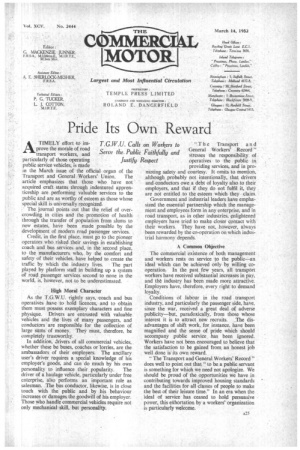Pride Its Own Reward
Page 27

If you've noticed an error in this article please click here to report it so we can fix it.
ATIMELY effort to improve the morale of road transport workers, and particularly of those operating public service vehicles, is made in the March issue of the official organ of the Transport and General Workers' Union. The article emphasizes that those who have not acquired craft status through indentured apprenticeship are performing valuable services to the public and are as worthy of esteem as those whose special skill is universally recognized.
The journal points out that the relief of overcrowding in cities and the promotion of health through the transfer of population from slums to new estates, have been made possible by the Idevelopment of modern road passenger services.
Credit, in the first place, must go to the pioneer operators who risked their savings in establishing coach and bus services and, in the second place, to the manufacturers who, by the comfort and safety of their vehicles, have helped to create the traffic by which the industry lives. The part played by platform staff in building up a system of road passenger services second to none in the world, is, however, not to be underestimated.
High Moral Character As the T.G.W.U. rightly says, coach and bus operatives have to hold licences, and to obtain them must possess exemplary characters and fine physique. Drivers are entrusted with valuable vehicles and the lives of Many passengers, and conductors are responsible for the collection of large SUMS of money. They must, therefore, be completely trustworthy.
In addition, drivers of all commercial vehicles, whether these be buses, coaches or lorries, are the ambassadors of their employers. The ancillary user's driver requires a special knowledge of his employer's goods, and can do much by his own personality to influence their popularity. The driver of a haulage vehicle, particularly under free enterprise, also performs an important role as salesman. The bus conductor, likewise, is in close touch with the public and by his behaviour increases or damages the goodwill of his employer. Those who handle commercial vehicles require not only mechanical skill, but personality. "T h e Transport a n d General Workers' Record" stresses the responsibility of operatives to the public in providing services, and in promoting safety and courtesy. It omits to mention, although probably not intentionally, that drivers and,conductors owe a debt of loyalty also to their employers, and that if they do not fulfil it, they are not entitled to the esteem which they claim.
Government and industrial leaders have emphasized the essential partnership which the manac,errient and employees form in any enterprise, atu in road transport, as in other industries, enlightened employers have tried to make closer contact with their workers. They have not, however, always been rewarded by the co-operation on which industrial harmony depends.
A Common Objective The commercial existence of both management and workers rests on service to the public—an ideal which can be achieved only by willing cooperation. In the past few years, all transport workers have received substantial increases in pay, and the industry has been made more attractive. Employers have, therefore, every right to demand loyalty.
Conditions of labour in the road transport industry, and particularly the passenger side, have, since the war, received a great deal of adverse publicity—but, paradoxically, from those whose interest it is to attract new recruits. The disadvantages of shift work, for instance, have been magnified and the sense of pride which should accompany public service has been ignored. Workers have not been encouraged to believe that the satisfaction to be gained from, an honest job well done is its own reward.
"The Transport and General Workers' Record" does well to point out that "to be a public servant is something for which we need not apologize. We should be proud of the opportunities we have in contributing towards improved housing standards and the facilities for all classes of people to make the best of their leisure time." In an era when the ideal of service has ceased to hold persuasive power, this eihortation by a workers' organization is particularly welcome.




















































































